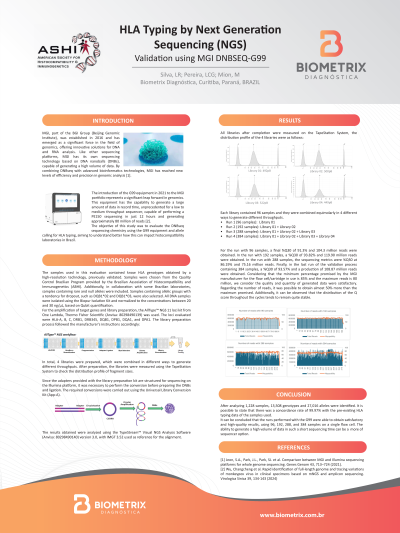HLA Typing by Next Generation Sequencing (NGS): Validation using MGI DNBSEQ-G99
(P711) HLA typing by Next Generation Sequencing (NGS)
Location: Platinum Ballroom

Poster Presenter(s)
Aim: MGI, a part of the BGI Group, introduced the G99 equipment in 2021, a significant advancement in genomics, offering efficient DNA and RNA analysis. The G99, utilizing DNA nanoballs (DNBs), providing high-volume data with exceptional speed, sequencing a PE150 sequencing in just 12 hours, yielding approximately 80 million reads. This study evaluates DNBseq sequencing chemistry using the G99 for HLA typing, aiming to understand its impact on histocompatibility laboratories.
Method: The samples used in this evaluation contained known HLA genotypes obtained by a high-resolution technology, previously validated. Samples were chosen from the Quality Control Brazilian Program provided by the Brazilian Association of Histocompatibility and Immunogenetics (ABHI). Additionally, in collaboration with some Brazilian laboratories, samples containing rare and null alleles were included. Samples containing allelic groups with a tendency for dropout, were also selected. For the amplification of target genes and library preparation, the AllType™ NGS 11 loci kit from One Lambda - Thermo Fisher Scientific was used. The loci evaluated were HLA-A, B, C, DRB1, DRB345, DQB1, DPB1, DQA1, and DPA1. Four libraries were prepared, each containing 96 samples, and combined to generate different throughputs. Libraries were measured for fragment size distribution using the TapeStation System. Sequencing results were analyzed using TypeStream™ Visual NGS Analysis Software.
Results: Libraries exhibited varying fragment size distributions. Different combinations of libraries yielded varying throughputs. Across runs, %Q30 and reads number were satisfactory, exceeding manufacturer promises.
Image attached:
Conclusion: The G99 runs produced high-quality results with 96 to 384 samples per flow cell. A concordance rate of 99.97% with pre-existing HLA typing data was achieved. The G99 offers a rapid, high-volume sequencing option for histocompatibility laboratories.
Method: The samples used in this evaluation contained known HLA genotypes obtained by a high-resolution technology, previously validated. Samples were chosen from the Quality Control Brazilian Program provided by the Brazilian Association of Histocompatibility and Immunogenetics (ABHI). Additionally, in collaboration with some Brazilian laboratories, samples containing rare and null alleles were included. Samples containing allelic groups with a tendency for dropout, were also selected. For the amplification of target genes and library preparation, the AllType™ NGS 11 loci kit from One Lambda - Thermo Fisher Scientific was used. The loci evaluated were HLA-A, B, C, DRB1, DRB345, DQB1, DPB1, DQA1, and DPA1. Four libraries were prepared, each containing 96 samples, and combined to generate different throughputs. Libraries were measured for fragment size distribution using the TapeStation System. Sequencing results were analyzed using TypeStream™ Visual NGS Analysis Software.
Results: Libraries exhibited varying fragment size distributions. Different combinations of libraries yielded varying throughputs. Across runs, %Q30 and reads number were satisfactory, exceeding manufacturer promises.
Image attached:
Conclusion: The G99 runs produced high-quality results with 96 to 384 samples per flow cell. A concordance rate of 99.97% with pre-existing HLA typing data was achieved. The G99 offers a rapid, high-volume sequencing option for histocompatibility laboratories.

